|
|
|
Sort Order |
|
|
|
Items / Page
|
|
|
|
|
|
|
| Srl | Item |
| 1 |
ID:
151191
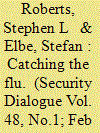

|
|
|
|
|
| Summary/Abstract |
How do algorithms shape the imaginary and practice of security? Does their proliferation point to a shift in the political rationality of security? If so, what is the nature and extent of that shift? This article argues that efforts to strengthen global health security are major drivers in the development and proliferation of new algorithmic security technologies. In response to a seeming epidemic of potentially lethal infectious disease outbreaks – including HIV/AIDS, Severe Acute Respiratory Syndrome (SARS), pandemic flu, Middle East Respiratory Syndrome (MERS), Ebola and Zika – governments and international organizations are now using several next-generation syndromic surveillance systems to rapidly detect new outbreaks globally. This article analyses the origins, design and function of three such internet-based surveillance systems: (1) the Program for Monitoring Emerging Diseases, (2) the Global Public Health Intelligence Network and (3) HealthMap. The article shows how each newly introduced system became progressively more reliant upon algorithms to mine an ever-growing volume of indirect data sources for the earliest signs of a possible new outbreak – gradually propelling algorithms into the heart of global outbreak detection. That turn to the algorithm marks a significant shift in the underlying problem, nature and role of knowledge in contemporary security policy.
|
|
|
|
|
|
|
|
|
|
|
|
|
|
|
|
| 2 |
ID:
173599
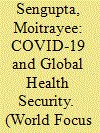

|
|
|
|
|
| Summary/Abstract |
ealth is a global public good. Other than being a fundamental human right under Article 25 of the United Nations Declaration of Human Rights, public health has appeared on the global security agenda more frequently from after the end of the Cold War. Departing from traditional views on state security, the post-Cold War world has witnessed greater international cooperation and global fellowship in tackling nontraditional security threats emerging from ethnic conflict, human migration, economic instability, environmental degradation and climate change, and epidemiological crises such as the spread of infectious disease, than ever before.
|
|
|
|
|
|
|
|
|
|
|
|
|
|
|
|
| 3 |
ID:
163916
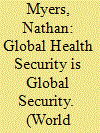

|
|
|
| 4 |
ID:
172074


|
|
|
|
|
| Summary/Abstract |
This article introduces the Special Issue on Global Health Security. It provides an overview of the health security threat spectrum, tracing how perceptions of biological and health security threats have evolved in broad terms over the last century from deliberately introduced disease outbreaks to also incorporate natural disease outbreaks, unintended consequences of research, laboratory accidents, lack of awareness, negligence, and convergence of emerging technologies. This spectrum of threats has led to an expansion of the stakeholders and tools involved in intelligence gathering and threat assessments. The article argues that to strengthen global health security and health intelligence, the traditional state-based intelligence community must actively engage with non-security stakeholders and incorporate space for new sources of intelligence. The aim of the Special Issue is to contribute to the larger effort of developing a multidisciplinary, empirically informed and policy-relevant approach to intelligence-academia engagement in global health security that serves both the intelligence community and scholars from a broad range of disciplines.
|
|
|
|
|
|
|
|
|
|
|
|
|
|
|
|
| 5 |
ID:
172108
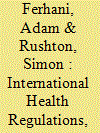

|
|
|
|
|
| Summary/Abstract |
It is often said that “diseases know no borders,” but COVID-19 has once again shown that policy responses certainly do. Governments have implemented bordering practices in a variety of ways to ensure that their own citizens are protected, even when in direct contravention to the International Health Regulations (IHR) of 2005. The IHR and the World Health Organization (WHO) have a strong preference for borders to remain open. Yet, we argue here, non-compliance by WHO member states is not the only problem with the IHR's treatment of borders. Bringing insights from critical border studies and exploring the varied ways in which the response to the COVID-19 crisis has been “bordered,” we argue that a much broader understanding of “borders” is required in the IHR and by the WHO, given that much of the exclusionary bordering we find takes place away from physical points of entry.
|
|
|
|
|
|
|
|
|
|
|
|
|
|
|
|
| 6 |
ID:
176212
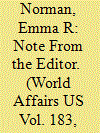

|
|
|
|
|
| Summary/Abstract |
At the time I am writing, we are witnessing unparalleled global uncertainty; social distancing; health system overload; rampant negative media sensationalism; enforced lockdown in Europe, the United States, and many other regions; and lasting economic upheaval across the world as a result of the rapid global spread of COVID-19, the novel coronavirus. There is a slim possibility that, by the time this issue of the journal goes to press, the immediate situation may have relaxed a very little in Europe, the United States, and elsewhere, as it appears to have done in Wuhan, China, where the virus originated. But projections indicate more than a little relaxation is extremely unlikely in the West, and unthinkable in other regions that have yet to face the worst onslaught—often with far fewer resources and woefully inadequate infrastructure. If lockdowns are relaxed, we can expect a series of waves of new infections in consequence for months to come—mitigated only by the hoped-for success of leveling-out strategies to alleviate, periodically, the pressure on our overburdened health systems and their tireless, courageous employees.
|
|
|
|
|
|
|
|
|
|
|
|
|
|
|
|
| 7 |
ID:
141063
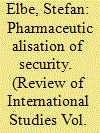

|
|
|
|
|
| Summary/Abstract |
Pharmaceuticals are now critical to the security of populations. Antivirals, antibiotics, next-generation vaccines, and antitoxins are just some of the new ‘medical countermeasures’ that governments are stockpiling in order to defend their populations against the threat of pandemics and bioterrorism. How has security policy come to be so deeply imbricated with pharmaceutical logics and solutions? This article captures, maps, and analyses the ‘pharmaceuticalisation’ of security. Through an in-depth analysis of the prominent antiviral medication Tamiflu, it shows that this pharmaceutical turn in security policy is intimately bound up with the rise of a molecular vision of life promulgated by the biomedical sciences. Caught in the crosshairs of powerful commercial, political, and regulatory pressures, governments are embracing a molecular biomedicine promising to secure populations pharmaceutically in the twenty-first century. If that is true, then the established disciplinary view of health as a predominantly secondary matter of ‘low’ international politics is mistaken. On the contrary, the social forces of health and biomedicine are powerful enough to influence the core practices of international politics – even those of security. For a discipline long accustomed to studying macrolevel processes and systemic structures, it is in the end also our knowledge of the minute morass of molecules that shapes international relations.
|
|
|
|
|
|
|
|
|
|
|
|
|
|
|
|
| 8 |
ID:
184097
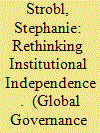

|
|
|
|
|
| Summary/Abstract |
This article examines institutional independence using the examples of the World Health Organization (WHO) and of the Public Health Emergencies of International Concern (PHEIC s) in a theoretical and a practical approach. It highlights the two different sources of authority of the WHO Secretariat, based on conditional negotiated legitimacy and epistemologically derived legitimacy, and how this authority is threatened by an increase in state party influence beyond what is envisaged in the WHO’s institutional setup. As a practical example, the article uses the PHEIC determinations, when the criteria as set out in the International Health Regulations (IHR) are not sufficient to explain the director-general’s decision to determine a PHEIC. Instead, this article offers evidence of state party influence. This challenge to the WHO’s legitimacy leads to a lack of institutional independence and, subsequently, to a declining basis for cooperation.
|
|
|
|
|
|
|
|
|
|
|
|
|
|
|
|
| 9 |
ID:
109870
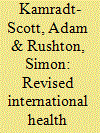

|
|
|
|
|
| Publication |
2012.
|
| Summary/Abstract |
This paper takes a constructivist approach to examining one of the new norms embodied in the recently revised International Health Regulations (IHR). The paper focuses on the provisions that seek to restrain states from applying disproportionate international travel and trade restrictions in response to a disease outbreak occurring in another country. This new norm, which aims to limit unjustified 'additional health measures', has significant implications for state sovereignty. Using the example of the 2009 H1N1 'swine flu' pandemic, the paper examines whether state behaviour and the discourse surrounding that outbreak supports a constructivist contention that a new norm has been created and that most states can be expected to comply with that norm most of the time. We conclude by discussing what the discourse over H1N1 suggests about the extent to which the new norm concerning additional health measures has been internalized by states.
|
|
|
|
|
|
|
|
|
|
|
|
|
|
|
|
| 10 |
ID:
187524
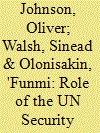

|
|
|
|
|
| Summary/Abstract |
The UN Security Council has increasingly involved itself in health emergencies over the last two decades, but the advantages and potential risk of its role have not been well explored. The experience Security Council intervention in the Ebola outbreak in Sierra Leone can be instructive, in particular because it contributed to the establishment of a first-ever UN emergency health mission. While this mission was not considered effective, Security Council involvement may have helped to mobilise resources, highlight the need for a cross-sectoral response, and maintain international flights. More broadly, however, questions remain about whether the securitisation of health risks diverting funding and policy focus towards the priorities of wealthy countries and away from basic health needs.
|
|
|
|
|
|
|
|
|
|
|
|
|
|
|
|
| 11 |
ID:
163171
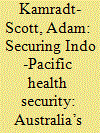

|
|
|
|
|
| Summary/Abstract |
In the wake of several prominent disease outbreaks like Ebola and Zika, global health security is once again high on the international agenda. For its part, the Australian government has committed itself to strengthening regional health security. This policy direction – focusing on the Indo-Pacific region – is both consistent with Australia’s traditional foreign policy approach of concentric circles informing strategic priorities, and is therefore understandable, even predictable. But given that local disease outbreaks in remote locations around the world now have the opportunity to travel rapidly internationally, is the adoption of an exclusively regional focus the most sensible one? This article considers the implications of Australia’s new regional health security initiative, its focus and direction. The paper weighs the benefits and drawbacks of Australia’s new programme and considers whether a wider focus is more appropriate for responding to the health threats of the twenty-first century.
|
|
|
|
|
|
|
|
|
|
|
|
|
|
|
|
| 12 |
ID:
168492
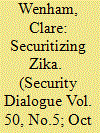

|
|
|
|
|
| Summary/Abstract |
Brazil’s Zika virus crisis (2015–17), following hot on the heels of the Ebola outbreak (2014–15), dominated newsfeeds and high-level discussions amid governments, the UN system and beyond, with emerging fears relating to Congenital Zika Syndrome (CZS), embodied by microcephaly. However, beyond the ensuing panic in Latin America facing a generation of Zika babies, the outbreak demonstrates key developments in our understanding of the interaction between health and security, based on the Copenhagen School’s securitization approach. It suggests that unlike previous diseases that were securitized, it was not the virus that was the cause of the security threat, nor how many people were affected, but a combined concern over where (in Brazil at a time of domestic political crisis), when (immediately post-Ebola), who (foetuses and babies), how (unknown disease characteristics) and what was the existential threat (the vectorized unknown). This article shows these developments for global health security through empirical analysis of the multiple securitization processes that occurred within Brazil for the Zika virus, at the subnational and federal levels.
|
|
|
|
|
|
|
|
|
|
|
|
|
|
|
|
| 13 |
ID:
178078
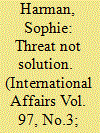

|
|
|
|
|
| Summary/Abstract |
COVID-19 has led to long overdue visibility of the gendered determinants and impacts of health emergencies and global health security. This article explores why gender was neglected in previous health emergencies, what led to change in visibility of gender issues during the first six months of the COVID-19 pandemic, and the implications of such change for understanding the relationship between gender and global health security. The article explores the question of neglect by drawing on original research into the 2014–16 Ebola outbreak in Sierra Leone, its aftermath and implications for future pandemic preparedness. The article then looks in detail at the research efforts, funding, epistemic community activism and impact of COVID-19 to explain why gender received high profile political attention and acknowledgment. The article argues that the change in visibility, research and advocacy around gender equality during the COVID-19 outbreak does not demonstrate an advancement in gender equality in global health. To the contrary, such visibility reinforces the inherent problems of global health security evident in the 2014–16 Ebola outbreak that create and reproduce binaries of neglect and visibility, and hierarchies of the global health issues that matter, the people that matter and the women that matter. What unites neglect and visibility of gender in global health security is that gender is understood as solution rather than threat. Combined these factors make gender equality incompatible with global health security.
|
|
|
|
|
|
|
|
|
|
|
|
|
|
|
|
| 14 |
ID:
172080
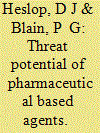

|
|
|
|
|
| Summary/Abstract |
The potential use of ‘pharmaceuticals’ has been identified by civilian law enforcement agencies, and counter-terrorism responders, as a threat that fills the gap between physical restraint and lethal weapons. This rise in availability of synthetic opiates reassessment of the overall public health threat from pharmaceutical based agents. The large quantities of illicitly synthetized novel opioids create a significant risk of accidental exposures or, potentially, a major deliberate release, and represents a global health security concern. Here we present a health security risk assessment of PBAs and approaches to threat prevention or mitigation, gaps in research, and medical countermeasure considerations.
|
|
|
|
|
|
|
|
|
|
|
|
|
|
|
|
|
|
|
|
|